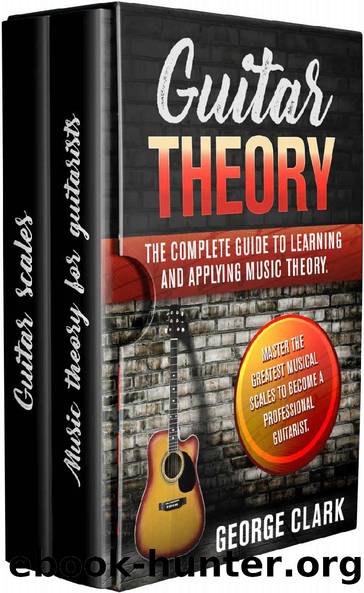GUITAR THEORY: The complete guide to learning and applying music theory. Master the greatest musical scales to become a professional guitarist. by George Clark

Author:George Clark [Clark, George]
Language: eng
Format: epub
Publisher: UNKNOWN
Published: 2020-10-21T00:00:00+00:00
MUSIC THEORY FOR GUITARISTS INTRODUCTION
We all know music theory is the language of music. Thus music theory's terminologies are its vocabulary. In music theory this is how we communicate terms. And we may articulate a thought in our mind and put it on paper.
Say, you know what a triad is all about? Interval? An interval? As for an octave? If you're not so in this human race, you 're not alone in trying to play the guitar and missing the philosophy behind it.
Most self-educated guitarists advance by learning to play the guitar without knowing 10 percent of the terminology involved in learning to play the guitar. Many mates of mine know nothing more than the names of the simple guitar chords. Sure they can play the D(seven), F(minor) and even F(sharp) and they don't know the chord name. That's because they're learning from sources other than those requiring a music degree, like a friend who knows a piece of music and just learns to play it through sound and watch him play.
The most logical explanation for this is that they know more through sound than through thought. In theory, that sounds more advantageous than picking up a book and going through music theory pages and pages just to forget why you first picked the book. Music theory books may be misleading and may end up making you hate music theory or even theories in general.
Most tutored guitarists advance too with learning to play by the rules alone. Well, that's a good thing because they're learning it the right way but they get too attached to playing by the rules they forget or say they deprive themselves of the exceptions. There is no perfect theory. This would be a statute, or regulation, if it were. So exemptions are the inseparable other side of the coin when it comes to theories. There are hundreds of examples for all the hypotheses inside music. These exceptions are the ones that make music so unique and wonderful to learn.
I began to learn the guitar myself by watching my uncle's music. But once I got the hang of the basic playing techniques, I wanted to know more about this language and I realized that, technically, I did not know anything about playing. As I began to learn the names of chords and all that was around it, I realized there were thousands of terms related to music theory. So, I just chose some that I needed to practice to pass my guitar lessons along. This way I 'm going to get my head in the game and I'm not going to sink in the sea of music jargon.
Learning the terms is all about what you want to know about the music you are actually trying to learn. There's no point in studying words you don't use at the moment or that it might be useful for use in the future. It's always good to know more in advance, but it's best to learn them with an example to have a long-term effect on our memories.
Download
This site does not store any files on its server. We only index and link to content provided by other sites. Please contact the content providers to delete copyright contents if any and email us, we'll remove relevant links or contents immediately.
The Goal (Off-Campus #4) by Elle Kennedy(12452)
Kathy Andrews Collection by Kathy Andrews(10560)
Diary of a Player by Brad Paisley(6872)
What Does This Button Do? by Bruce Dickinson(5537)
Assassin’s Fate by Robin Hobb(5256)
Big Little Lies by Liane Moriarty(4894)
Pale Blue Dot by Carl Sagan(4018)
Sticky Fingers by Joe Hagan(3459)
The Heroin Diaries by Nikki Sixx(2943)
The Death of the Heart by Elizabeth Bowen(2911)
Beneath These Shadows by Meghan March(2731)
The Help by Kathryn Stockett(2710)
Confessions of a Video Vixen by Karrine Steffans(2684)
How Music Works by David Byrne(2540)
Jam by Jam (epub)(2497)
Harry Potter 4 - Harry Potter and The Goblet of Fire by J.K.Rowling(2422)
Strange Fascination: David Bowie: The Definitive Story by David Buckley(2371)
Petty: The Biography by Warren Zanes(2241)
Darker Than the Deepest Sea by Trevor Dann(2214)
